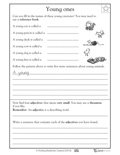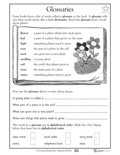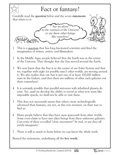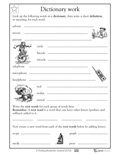What are baby animals called?
Skill: Research and writing practice

What do you call a baby cow? Look it up!
This reading worksheet builds crucial research skills your third grader will need increasingly this year and in years to come. They can use a dictionary, thesaurus, or other sources to look up answers; then they will write down what they learn and use complete sentences.
Patterns in poems
Skill: Compare and contrast

Stanzas and syllables and rhythm, oh my!
Poetry doesn’t have to be difficult or dreary — it’s all a matter of helping your child understand it. This reading worksheet helps your child understand the structure and rhythm of two short poems by reading them aloud, counting syllables, noting rhyming words, and paying attention to how words are used to convey meaning.
Glossary
Skill: Research basics

Have you heard about the nonfiction revolution?
Schools are putting new emphasis on children doing research and reading nonfiction. This reading worksheet, which helps kids understand what a glossary is and how to use it, will help your child build these important skills.
Fact or fantasy?
Skill: Identifying key words

All about aliens!
Are there other beings in the universe just like us? This reading worksheet offers seven statements about the universe, the galaxy, and the possibility of aliens. It gives your child practice reading, processing, and noting key points in nonfiction text.
Using a dictionary
Skill: Decoding words

Did you know that invent and prevent have the same root?
Building on your third grader’s research skills, this reading worksheet asks your child to practice looking up words and writing down their definitions. It also asks them to think about how root words have the same meaning, even when they become part of new words with different meanings.






